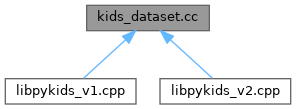 |
KIDS
ver-0.0.1
KIDS : Kernel Integrated Dynamics Simulator
|
 |
KIDS
ver-0.0.1
KIDS : Kernel Integrated Dynamics Simulator
|

Go to the source code of this file.
Functions | |
| py::class_< Shape > | PyShape (m, "Shape", py::dynamic_attr()) |
| PyShape def(py::init< std::vector< std::size_t > >()).def(py py::class_< DataSet > | PyDataSet (m, "DataSet", py::dynamic_attr()) |
| PyDataSet | def (py::init<>()) |
| PyDataSet | def ("_def", [](DataSet &self, const std::string &key, py::tuple pyTuple, const std::string &dtype, const std::string &doc) { std::vector< std::size_t > shape;shape.reserve(pyTuple.size());for(size_t i=0;i< pyTuple.size();++i) { int value=pyTuple[i].cast< int >();shape.push_back(value);} if(dtype=="int") { self._def_int(key, Shape{shape}, doc);} else if(dtype=="real") { self._def_real(key, Shape{shape}, doc);} else if(dtype=="complex") { self._def_complex(key, Shape{shape}, doc);} else { } }, py::arg("key"), py::arg("shape"), py::arg("dtype")="int", py::arg("doc")="") |
| PyDataSet | def ("_undef", &DataSet::_undef, py::arg("key")="0") |
| PyDataSet | def ("numpy", [](DataSet &self, const std::string &key) { auto inode=self.node(key);kids_dtype n_type=inode->type();switch(n_type) { case kids_int_type:{ std::size_t n_size=static_cast< Tensor< kids_int > * >(inode) ->size();void *n_data=static_cast< Tensor< kids_int > * >(inode) ->data();return py::array({n_size}, {sizeof(int)},(int *) n_data, py::capsule(n_data, [](void *_void_n_data) { ;}));break;} case kids_real_type:{ std::size_t n_size=static_cast< Tensor< kids_real > * >(inode) ->size();void *n_data=static_cast< Tensor< kids_real > * >(inode) ->data();return py::array({n_size}, {sizeof(kids_real)},(kids_real *) n_data, py::capsule(n_data, [](void *_void_n_data) { ;}));break;} case kids_complex_type:{ std::size_t n_size=static_cast< Tensor< kids_complex > * >(inode) ->size();void *n_data=static_cast< Tensor< kids_complex > * >(inode) ->data();return py::array({n_size}, {sizeof(kids_complex)},(kids_complex *) n_data, py::capsule(n_data, [](void *_void_n_data) { ;}));break;} default:throw std::runtime_error("can not converted to numpy!");} return py::array();}) |
| PyDataSet | def ("help", [](DataSet &self, const std::string &name) { return self.help(name);}, py::arg("name")="") |
| PyDataSet | def ("__repr__", [](DataSet &self) { return self.repr();}) |
| PyDataSet def | ( | "__repr__" | , |
| [] (DataSet &self) { return self.repr();} | ) |
| PyDataSet def | ( | "_def" | , |
| [] (DataSet &self, const std::string &key, py::tuple pyTuple, const std::string &dtype, const std::string &doc) { std::vector< std::size_t > shape;shape.reserve(pyTuple.size());for(size_t i=0;i< pyTuple.size();++i) { int value=pyTuple[i].cast< int >();shape.push_back(value);} if(dtype=="int") { self._def_int(key, Shape{shape}, doc);} else if(dtype=="real") { self._def_real(key, Shape{shape}, doc);} else if(dtype=="complex") { self._def_complex(key, Shape{shape}, doc);} else { } } | , | ||
| py::arg("key") | , | ||
| py::arg("shape") | , | ||
| py::arg("dtype") | = "int", | ||
| py::arg("doc") | = "" ) |
| PyDataSet def | ( | "_undef" | , |
| &DataSet::_undef | , | ||
| py::arg("key") | = "0" ) |
| PyDataSet def | ( | "help" | , |
| [] (DataSet &self, const std::string &name) { return self.help(name);} | , | ||
| py::arg("name") | = "" ) |
| PyDataSet def | ( | "numpy" | , |
| [] (DataSet &self, const std::string &key) { auto inode=self.node(key);kids_dtype n_type=inode->type();switch(n_type) { case kids_int_type:{ std::size_t n_size=static_cast< Tensor< kids_int > * >(inode) ->size();void *n_data=static_cast< Tensor< kids_int > * >(inode) ->data();return py::array({n_size}, {sizeof(int)},(int *) n_data, py::capsule(n_data, [](void *_void_n_data) { ;}));break;} case kids_real_type:{ std::size_t n_size=static_cast< Tensor< kids_real > * >(inode) ->size();void *n_data=static_cast< Tensor< kids_real > * >(inode) ->data();return py::array({n_size}, {sizeof(kids_real)},(kids_real *) n_data, py::capsule(n_data, [](void *_void_n_data) { ;}));break;} case kids_complex_type:{ std::size_t n_size=static_cast< Tensor< kids_complex > * >(inode) ->size();void *n_data=static_cast< Tensor< kids_complex > * >(inode) ->data();return py::array({n_size}, {sizeof(kids_complex)},(kids_complex *) n_data, py::capsule(n_data, [](void *_void_n_data) { ;}));break;} default:throw std::runtime_error("can not converted to numpy!");} return py::array();} | ) |
| PyDataSet def | ( | py::init<> | () | ) |
| PyShape def(py::init< std::vector< std::size_t > >()).def(py py::class_< DataSet > PyDataSet | ( | m | , |
| "DataSet" | , | ||
| py::dynamic_attr() | ) |
| py::class_< Shape > PyShape | ( | m | , |
| "Shape" | , | ||
| py::dynamic_attr() | ) |